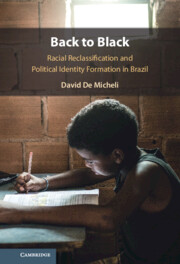Book contents
- Back to Black
- Back to Black
- Copyright page
- Epigraph
- Contents
- Figures
- Tables
- Acknowledgments
- 1 Introduction
- 2 The Puzzle of Racial Reclassification
- 3 Theory
- 4 Education as a Mechanism of Exposure
- 5 Education and Reclassification
- 6 Affirmative Action and Reclassification
- 7 Implications for National Politics
- 8 Conclusion
- References
- Index
7 - Implications for National Politics
Published online by Cambridge University Press: 14 November 2024
- Back to Black
- Back to Black
- Copyright page
- Epigraph
- Contents
- Figures
- Tables
- Acknowledgments
- 1 Introduction
- 2 The Puzzle of Racial Reclassification
- 3 Theory
- 4 Education as a Mechanism of Exposure
- 5 Education and Reclassification
- 6 Affirmative Action and Reclassification
- 7 Implications for National Politics
- 8 Conclusion
- References
- Index
Summary
Chapter 7 identifies and tests implications of the argument for contemporary Brazilian politics. Specifically, I test whether black identifiers with high levels of education exhibit distinct patterns of behavior, mainly in the electoral arena. I compile and analyze high-quality election survey data collected by reputable domestic firms between 2002 and 2018 and show that highly educated, black voters have become a loyal leftist constituency, rallying consistently around the leftist Workers’ Party since 2002. These voters are more ideologically leftist than either their lesser-educated black or better-educated white counterparts. This pattern holds even in the face of political instability stemming from major corruption scandals in 2005 and 2015, as well as the rise of far-right populist leader Jair Bolsonaro in 2018. This chapter illustrates the expectations of the policy feedback literature, showing that policy reforms “feed back” into the political process by altering the identities, interests, and behavior of citizens.
Keywords
- Type
- Chapter
- Information
- Back to BlackRacial Reclassification and Political Identity Formation in Brazil, pp. 209 - 247Publisher: Cambridge University PressPrint publication year: 2024

